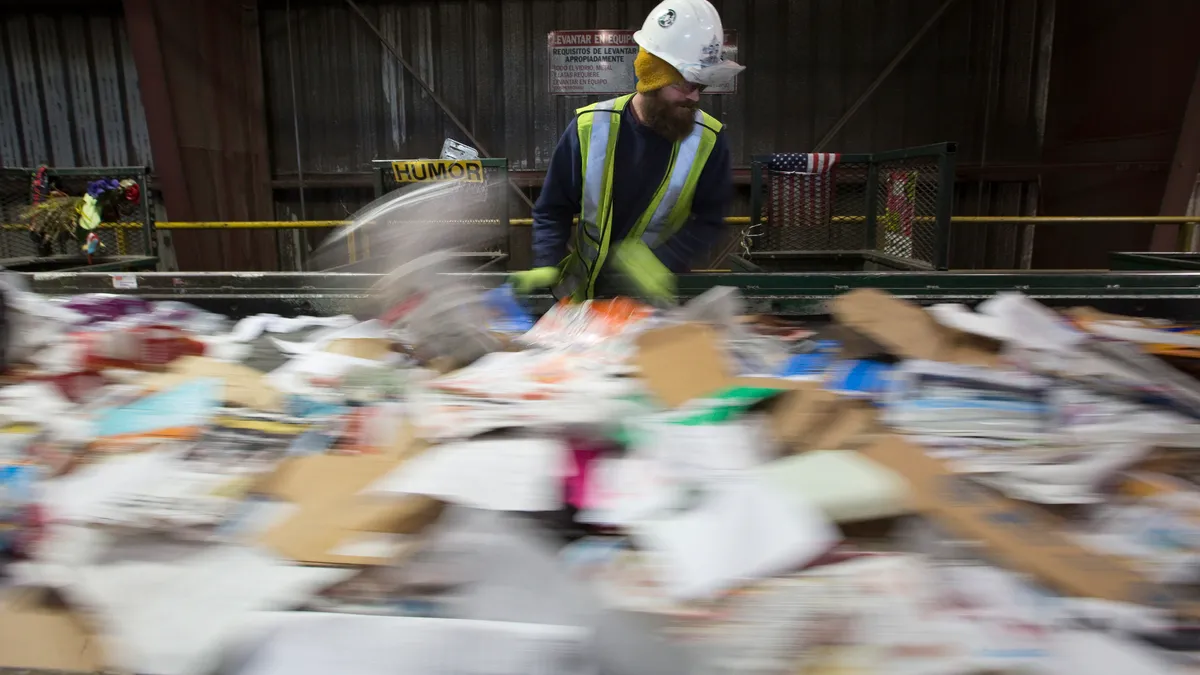A new bill in Congress aims to identify possible health detriments from plastics, limit their production and set nationwide reduction targets.
Sen. Cory Booker, D-N.J., and Rep. Jared Huffman, D-Calif., last week introduced the Protecting Communities From Plastics Act, which aims to further regulate the plastics manufacturing industry, temporarily pause permitting for certain facilities and create incentives for more reuse and refill programs.
“Plastic pollution isn’t just a problem for our oceans and climate — it's a massive environmental injustice, directly impacting frontline and fenceline communities throughout the plastics lifecycle,” Huffman said in a statement.
They introduced the bill along with Sen. Jeff Merkley, D-Ore., and Rep. Alan Lowenthal, D-Calif., who previously reintroduced the Break Free From Plastic Pollution Act in 2021. That bill included numerous plastic reduction provisions, including a similar permit restriction provision, but so far has failed to move forward.
The Protecting Communities bill makes transitioning away from plastics a priority. As the U.S. shifts away from using fossil fuels for power and transportation, it should also reduce fossil fuel-based plastics production, the bill states.
The bill would direct the EPA to create federal targets for plastic source reduction and reuse for all single-use plastic packaging and foodservice ware in the country by December 31, 2027. It would set a minimum 25% source reduction target and a reuse and refill target of at least 30% by 2032. Medical equipment, PPE and some other types of items would be exempt.
To incentivize reuse and refill projects, the bill also calls for an EPA grant program for projects that “support equity and innovation” by making such systems more affordable, accessible or convenient. The programs should have “an emphasis on ensuring benefits are realized in environmental justice communities,” Booker said in a statement.
The bill also focuses on certain chemicals used in plastics production, including “high-priority substances” like styrene and vinyl chloride. It calls for the EPA to determine whether such substances could cause or contribute to “adverse public health impacts” and possibly classify them as toxic under the Toxic Substances Control Act.
The bill calls for the National Academy of Sciences and the National Institutes of Health to conduct a study on the environmental, public health, pollution and environmental justice impacts of certain plastic products and their production methods.
It also has numerous environmental justice requirements for plastic production and chemical recycling facilities. One would require future permit applications to include a statement describing potential EJ impacts to fenceline communities and require the facility to open a public comment period and host a community meeting to get input from neighboring community members. That provision is similar to New Jersey’s EJ law. It would also compel facilities to meet detailed emissions and fenceline monitoring requirements, and much of the data would be required to be “made available to the public in real time.”
Further, the bill would require certain state agencies to create a job position that “supports fenceline communities in understanding technical nuances” of permits and accounts for communities’ main spoken languages.
However, the new legislation would also enact a “temporary pause period” for permitting certain new and expanded plastics production and chemical recycling facilities, and would also prohibit export of certain products from those facilities. MRF operators, mechanical recyclers and composters would be exempt from this provision, according to the bill.
Numerous environmental groups back the bill. Anja Brandon, associate director of U.S. plastics policy at the Ocean Conservancy, said in a statement the bill “ensures that the U.S. does not continue to rely on harmful systems that perpetuate single-use in the form of chemical recycling or incineration” and would prevent the EPA from including chemical recycling technologies in its national recycling strategy. That strategy currently mentions chemical recycling as a possible waste diversion tacticc.
However, the American Chemistry Council said the bill is “misguided” and “is a raw deal for America.” Joshua Baca, ACC’s vice president of plastics, said the bill would “stall the acceleration of a circular economy for plastics currently underway” and would cause job loss and jeopardize “billions of dollars of investments in new technology.”
The Plastics Industry Association said the bill contains “hyperbole” that will create more divisiveness.
“In their rush to demagogue, the authors of this bill fail to recognize that plastic is essential to society,” said Matt Seaholm, PLASTICS’ president and CEO, in a statement.















